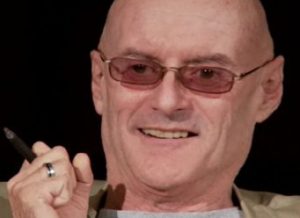 Frank Visser
Frank VisserThe Dutch writer Frank Visser once figured as the major partisan exegete of Ken Wilber. His book Ken Wilber: Thought as Passion (2003) was published by the State University of New York Press. Visser was here described as “an internet specialist who studied the psychology of religion at the Catholic University of Nijmegen, The Netherlands.”
The publisher classified Visser’s book in terms of: “the definitive guide to the life and work of Ken Wilber, widely regarded as the most comprehensive and passionate philosopher of our times.”
Visser’s contribution was strongly in support of Wilber. At the end of nearly 300 pages, Visser offers a chapter entitled “Ken Wilber in Perspective.” This covers science, psychology, and religion. Visser here states that “Wilber counts as the leading theorist” in transpersonal psychology (page 267). That version of psychology “first emerged as an academic discipline at the end of the sixties” (ibid). Wilber himself was not an academic.
Visser dwells on the differences between Wilber and C. G. Jung. “Wilber is of the opinion that Jung has prompted an extremely regressive movement in psychology” (page 265). A basic contention here is that the Jungian stress upon the “collective” is a mistaken denominator for too many contrasting ingredients, including the spiritual, the prerational, and the regressive. One aspect of this drawback is seen by Visser in “writers inspired by Jung who interpret the wild or primitive aspect of our nature as spirituality” (page 265).
A well known rival of Wilber was Stanislav Grof, a psychiatrist who innovated the term transpersonal, being influential in the movement associated with that word. Grof gained a repute for therapy practices and the use of mind-altering drugs, including LSD. His perinatal theory has met with denial in some directions. Grof believed that his theory was based on clinical evidence, which he thought to be lacking in Wilber. “In many respects Wilber and Grof stand at opposite ends of the spectrum” (page 270). There are strong opponents of both Wilber and Grof (Ken Wilber and integralism).
 Ken Wilber
Ken WilberVisser expressed enthusiasm for the “perennial philosophy” aspect of Wilber’s conceptualism. The Dutch commentator tended to define this factor in terms of: “Each world religion has its own esoteric or mystical core, and, in addition to this, there are also schools of thought developed by individual philosophers who have attempted to formulate this esoteric core in a way that makes it more comprehensible” (page 276). According to Visser, “the esoteric aspects of Wilber’s model are based largely on the philosophy of Shri Aurobindo,” while “Wilber has also borrowed ideas from contemporary mystics, such as Adi Da Samraj” (page 276).
Moving into less controversial topics, Visser stated that the “perennialists or traditionalists” included Ananda Coomaraswamy, Rene Guenon, Frithjof Schuon, and Huston Smith. The first three names are landmarks in the traditional version of perennialism. Smith was a strong influence on Wilber. Visser informed: “Wilber has explored contemporary philosophy to a far greater extent than most of the traditionalists, who often abhor modern society” (page 276).
The commentator went on to compare the Theosophical tradition with Wilber themes. “Theosophy might be described as an early nineteenth century, Western attempt to reformulate the perennial philosophy in more contemporary language” (page 277). Visser here finds an affinity “with the Western neoplatonic tradition partly expounded by Plotinus who is highly admired by Wilber” (ibid).
Views about Theosophy can differ markedly; there is no obvious resemblance between Theosophy and Plotinus. Wilber’s version of Plotinus has met with disagreement. Visser moves on to discuss a Western Vedanta, here employing a phrase used by Wilber (who is also strongly associated with Mahayana Buddhism). Visser refers to the Dutch “philosopher and theosophist” Johannes J. Poortman (d.1970), a former professor of metaphysics at Leiden University, who “often described his system as a Western form of Vedanta” (page 282).
The information is supplied that Poortman, similar to Wilber, “was extremely sceptical about the kind of holism that is based on quantum physics, which seeks to suggest that modern physics had stumbled across the deepest Mystery” (page 283).
Visser asserted: “Plotinus, Poortman, and Wilber are all mystical philosophers who have a great deal of faith in the capacity of the intellect and who therefore attach a great deal of value to any form of scientific research. For this reason they oppose any movements which denounce rationalism under the guise of spirituality and seek salvation in the romanticism of holism” (page 284).
This perspective was later seen to have complications. Visser subsequently became a critic of Wilber, abandoning his partisan stance. The element of scientific research in Wilber’s output here became minimal. Although Ken Wilber did advocate a rational stance, Frank Visser arrived at the conclusion that this form of rationalism is limited. The question now also arises: what exactly is a mystical philosopher?
Visser’s tangent from Wilber emerged soon after the publication of his book (translated from Dutch). Rarely does any author transit so strongly and speedily from formerly held assessments. Visser became well known for his new attitude that Wilber’s version of “integralism” was a minefield rather than a solution to all problems (Reaching Out to the World).
A major drawback is that Ken Wilber tended to present his theories as all-embracing and comprehensive. He referred to his doctrines as AQAL, an abbreviation for “all quadrants, all levels, all lines, all states, all types” (ibid:xiii, foreword by Wilber). Quadrant theory could easily be accused of assuming a stance of quasi-omniscience.
The dissenting Frank Visser has maintained a website featuring criticism of Ken Wilber. This site is called Integral World. Visser has remained an integralist, but not a copyist of Wilber. There are different forms of integralism, including authors other than Visser and Wilber. A complexity is that certain authors do not call themselves integralists. Which is the most accurate and comprehensive form of “integralism”? This could easily become a major issue.
Observers noticed a commotion in the integralist camp, occurring at blog level. In 2006, Wilber attacked Visser and other critics in a blog featuring aspersive language deemed vulgar by some assessors. Wilber here also referred to himself in terms of the lawman resisting outlaws (Visser, The Wild West Wilber Report).
A decisive schism was in process. The dissenters and critics would not accept the blog bludgeoning and caricature expressed by Wilber. Visser hosted other critical writers (e.g., Jeff Meyerhoff) at his website. To be more precise, the growing number of contributors at Integral World included Wilber critics, Wilber supporters, and yet other categories.
Perhaps in response to some of the criticism, Wilber wrote a new book called Integral Spirituality (2006). Visser described this as “disappointing, both in style and content.” However, he did concede that Wilber had changed format. See the Visser review. The American writer claimed a relevant assessment of modernity and postmodernity, also an ongoing knowledge of religious traditions. This new AQAL presentation amounted to “integral post-metaphysics.”
The founding of the Integral Institute, by Ken Wilber, was a focus for critical attention from Visser and others. The partisan description of a “visionary think-tank” was countered by allegations such as workshop entrepreneurialism, plus the drawback of allegiance with controversial figures, including the neo-Advaita guru Andrew Cohen.
Visser composed numerous web articles demonstrating his critical attitude to the man he had formerly promoted. It is difficult to find any trace of his former “theosophical” inclination. “I consider Ken Wilber’s view of evolutionary theory to be deeply flawed and disconnected from the scientific literature” (Spirit of Evolution Reconsidered). Visser here stresses: “A detailed engagement with Darwinism is virtually absent from his [Wilber’s] writings.”
Visser mentions the second Integral Theory Conference of 2010 in San Francisco, an event which attempted to modify the Wilber-centric approach. He also refers to the third Integral Theory Conference of 2013 at San Francisco, featuring a confrontation of the Wilber model “with two other luminaries in the wider integral field: philosopher Roy Bhaskar and sociologist-philosopher Edgar Morin.” These entities are described as professional philosophers who share the “same multidisciplinary spirit.” See Integral Theory.
The crux for integralism would appear to be a multidisciplinary orientation, something which is not fundamental to professional philosophy and nor restricted to contemporary paradigms of spirituality.
Bibliography
Grof, Stanislav, Psychology of the Future (Albany: State University of New York Press, 2000).
Meyerhoff, Jeff, Bald Ambition: A Critique of Ken Wilber’s Theory of Everything (Inside the Curtain Press, 2010).
Shepherd, Kevin R. D., Pointed Observations (Dorchester: Citizen Initiative, 2005).
Visser, Frank, Ken Wilber: Thought as Passion (Albany: State University of New York Press, 2003).
Wilber, Ken, Integral Spirituality (Boston: Integral Books, 2007).
Kevin R. D. Shepherd
ENTRY no. 55
Copyright © 2013 Kevin R. D. Shepherd. All Rights Reserved.
 Frank Visser
Frank Visser Ken Wilber
Ken Wilber Frank Visser
Frank Visser Ken Wilber
Ken Wilber